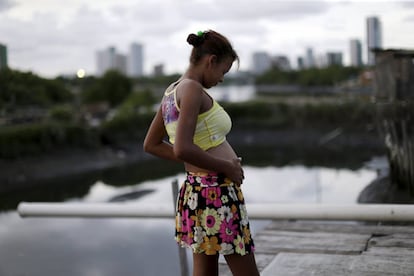Abortion requests on the rise in South America amid Zika fears
The number of women seeking terminations has doubled in Brazil, Ecuador and Venezuela, says new study

South American countries affected by the Zika virus are experiencing an unprecedented rise in requests for abortions, a study published on Wednesday revealed. The virus only causes mild symptoms in most cases but it can lead to severe birth defects. Since abortion is illegal in many of the countries affected, some pregnant women may have to bear children against their will. The World Health Organization (WHO) has urged countries with Zika outbreaks to allow women to terminate unwanted pregnancies.
There is a correlation between Zika alerts and a sharp increase in abortion requests, researchers said in a study published in the New England Journal of Medicine. The authors examined the number of requests sent to a Dutch non-profit organization, Women on the Web, that provides abortion pills to women who do not have access to medical interventions. Researchers looked at the trend in demand between January 2010 and March 2016 in 19 Latin American countries that issued an alert saying the Zika virus may cause birth defects.
It is not enough for governments to warn women of the risks associated with Zika, they should also make an effort to make sure women have enough safe, legal and accessible reproductive options
The study says orders for the pills increased dramatically in countries that issued such warnings, including recommendations that women delay pregnancies, and where abortion is illegal. Demand for abortions has doubled in Ecuador, Venezuela and Brazil, the Latin American nation most severely affected. The number of requests increased by at least one-third in most of the other countries that the study examined. Researchers say there was no upward trend in countries that did not issue health warnings.
“It is difficult to get reliable data on the reproductive choices of women in Latin America,” says Abigail Aiken, a researcher at the University of Texas at Austin who co-authored the study. “It is to be expected that our method is underestimating the impact health warnings have had on abortion requests, given that many women have used very unsafe methods to abort or resorted to clandestine methods,” she adds.
Sign up to our newsletter
EL PAÍS English Edition has launched a weekly newsletter. Sign up today to receive a selection of our best stories in your inbox every Saturday morning. For full details about how to subscribe, click here.
In Brazil, Zika concerns have revived the debate on the country’s abortion laws, which have not changed much since the 1940s. News reports say some Brazilian women resort to secret abortion clinics even before they are diagnosed with the virus.
“It is not enough for governments to warn women of the risks associated with Zika, they should also make an effort to make sure women have enough safe, legal and accessible reproductive options,” says Catherine Aiken, a researcher at the University of Cambridge and co-author of the study.
Researchers from Princeton University and the University of Edinburgh also contributed to the report.
English version by Dyane Jean François.
Tu suscripción se está usando en otro dispositivo
¿Quieres añadir otro usuario a tu suscripción?
Si continúas leyendo en este dispositivo, no se podrá leer en el otro.
FlechaTu suscripción se está usando en otro dispositivo y solo puedes acceder a EL PAÍS desde un dispositivo a la vez.
Si quieres compartir tu cuenta, cambia tu suscripción a la modalidad Premium, así podrás añadir otro usuario. Cada uno accederá con su propia cuenta de email, lo que os permitirá personalizar vuestra experiencia en EL PAÍS.
¿Tienes una suscripción de empresa? Accede aquí para contratar más cuentas.
En el caso de no saber quién está usando tu cuenta, te recomendamos cambiar tu contraseña aquí.
Si decides continuar compartiendo tu cuenta, este mensaje se mostrará en tu dispositivo y en el de la otra persona que está usando tu cuenta de forma indefinida, afectando a tu experiencia de lectura. Puedes consultar aquí los términos y condiciones de la suscripción digital.









































